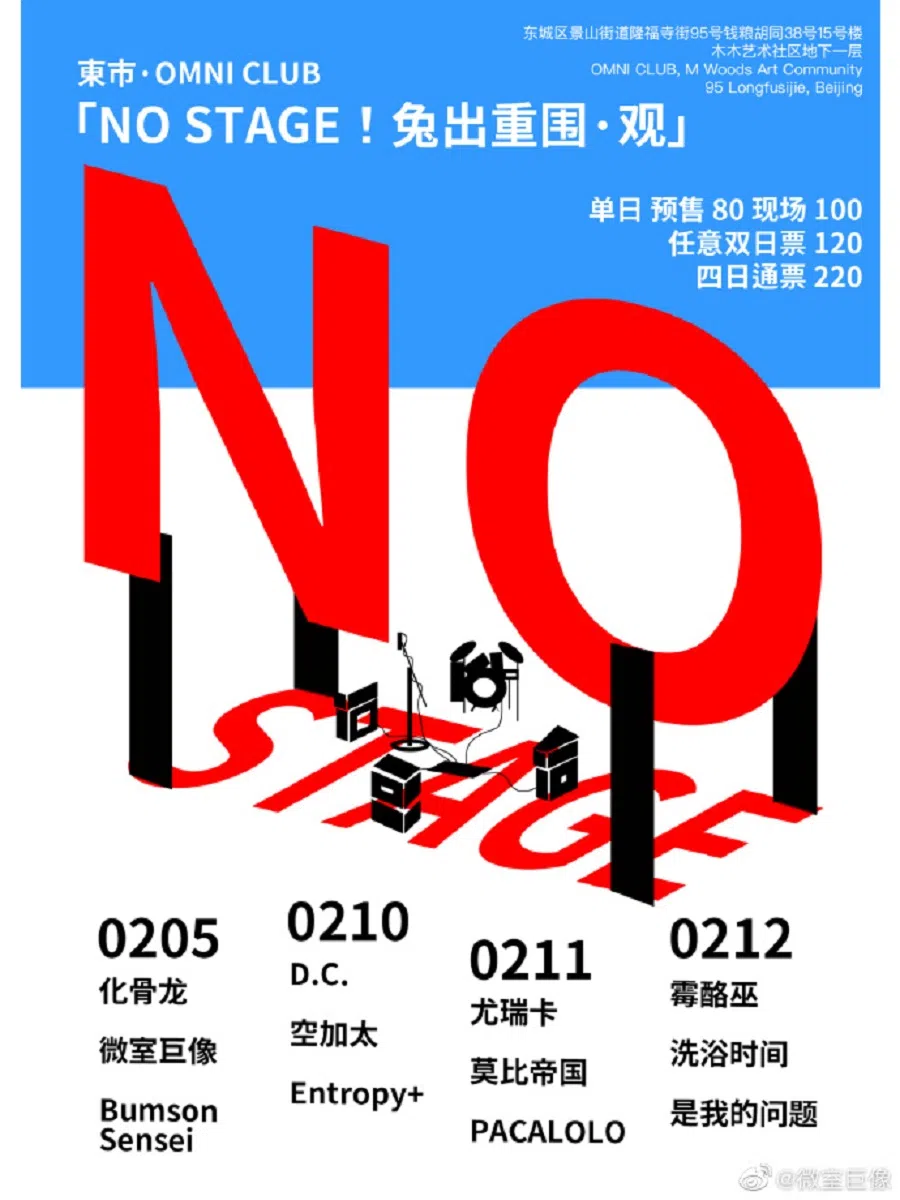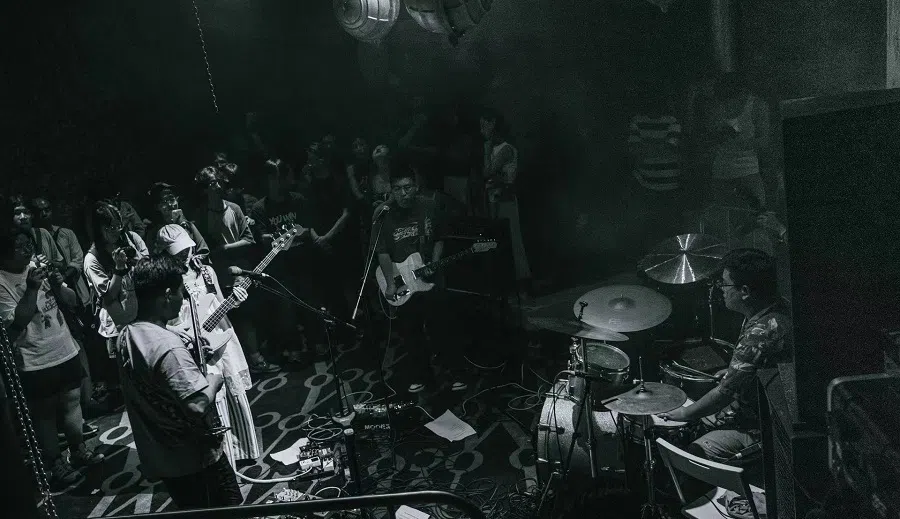Rocking on: The live music scene in China finds its way
While the initial rebound after the Covid lull excited many in the rock band industry, this soon fizzled out as economic pressures took a toll. But Chinese rock bands are as effervescent as ever, regrouping and finding new ways of connecting with audiences. Will Griffith, founder of LiveChinaMusic, tells us more.

(Photos provided by Will Griffith, unless otherwise stated.)
By and large, music scenes around the globe are suffering — both economically and spiritually. And while Covid wasn’t the de facto cause, it certainly sped things up to get to where we are now.
But China’s path was different. With major cities around China going into lockdown on and off up until 2023, the rocky road to opening up was met with a rebound that had many in the industry excited. There was news of the number of music festivals breaking records, bands selling out shows across the country and live houses popping up in third- and fourth-tier cities. But the afterglow soon faded as reality set in and the economy cooled off.
The music variety show The Big Band《乐队的夏天》— one of the country’s siphons for introducing mainstream TV viewers to rock and roll — won’t be returning after its third season. Festivals have been scrambling amid changing regulations, sometimes even cancelling stacked lineups just weeks prior. And venues are shuttering across the country, struggling to make ends meet as fans start to prioritise where they put their money.
... they realised they had missed the sweat and elated exuberance that came with performing in smaller-scale venues...
Thinking big, keeping it small
So where does that leave rock and roll in mainland China today? Well, on the offensive. Turning inwards, surveying the scene and finding the best route forward. For some that means reconnecting with your core audience; for many, it means forging new connections outside of China; and for others, it’s about shifting the expectations of audiences.
Take Fazi for instance. After the Xi’an post-punk band saw their cachet rise exponentially after a stint on the second season of The Big Band, the band was able to enjoy a succession of shows in large-scale venues across the nation and jump on any festival billing they saw fit. When the band finally made it to the US earlier this year — as part as an invitation from South By Southwest (SXSW) — they realised they had missed the sweat and elated exuberance that came with performing in smaller-scale venues: “Face-to-face connections….it was refreshing,” guitarist Ma Cheng puts forth in a recent documentary about their US tour. This led to the band organising their latest China tour, kicking off in August, in venues with limited capacity.
“With a traditional stage there will always be the physical boundary between the performance and the audience — ‘No Stage’ [shows] break this…allowing for a closer link”. — Tianle Wang, Xinxiang indie rock band Stranded Strawberries


At a time where small-scale venues are being snuffed out, it’s a great way to put the spotlight on these venues, as well as recapture the spirit of rock and roll in its purest form. Whether or not other bands of their stature will follow suit remains to be seen, but already you can see touring bands opting for more intimate surroundings. “No Stage” shows, where bands opt to perform on the ground surrounded by audiences, have become increasingly common, a trend that seems to indicate that contemporary livehouses lack a personable touch. As Tianle Wang, of emerging Xinxiang indie rock band Stranded Strawberries, states, “With a traditional stage there will always be the physical boundary between the performance and the audience — ‘No Stage’ [shows] break this…allowing for a closer link”. Clearly, there’s a desire to get back to basics — to reconnect with your audiences and to build lasting relationships, instead of just becoming the latest trend. It’s looking at the long view instead of simply trying to strike while the iron is hot.
“I believe the exchanges between Chinese and Southeast Asian bands will become more frequent. Some of my friends are already establishing various new connections.” — Xu Bo, Lead, Chinese Football
Connecting with Southeast Asian bands
This idea of forging new, lasting relationships can be seen on the international circuit too — with mainland bands looking more and more toward neighbouring countries in East Asia and Southeast Asia. There is no better example of this than Chinese Football.
The Wuhan emo torchbearers have always looked to Japan in their humble beginnings, with its lead Xu Bo setting up a record imprint in Koyoto — Sango Records in 2009 — to help facilitate the flow of music into the country and to help set up the band’s eventually foray into the music scene there. “I thought the label could serve as a bridge. So, I tried to release physical albums of some Japanese bands in China and introduce interesting Chinese indie music overseas, establishing a network for independent music between China and other Asian countries.”
That network eventually led the band to Southeast Asia — with Chinese Football performing in cities like Singapore, Manila, and Bangkok last month, alongside mammoth acts like Deafheaven. “I believe the exchanges between Chinese and Southeast Asian bands will become more frequent. Some of my friends are already establishing various new connections.”

This exchange with Southeast Asia only seems to be on the rise, with more and more promoters bringing in Thai bands and vice versa. As Tao Yun of promotion team Morning, who will be hosting Bangkok indie funk act Ford Trio this fall, puts it, “there are many historical, cultural, and linguistic ties to each other, making it easier to connect and empathise with the audience and the bands. And with the opening up of the world after the epidemic and the modification of visa policies, it has made communication between the two sides much easier.”
“At present the festival market is booming, but it lacks the vitality to really move forward.” — K, SoundFact
Curation of the unique
We can always see how festivals might evolve in the coming years through some of its most notable organisers. Still reeling from recent regulation changes, some organisers are steering away from the bombast and excess of recent lineups — which often felt like they were pieced together through algorithms. Rather, they’re focusing on curation and providing unique musical experiences such as SonicJam.
SoundFact, run by Fan Kai (who goes by K) in Xi’an, has been running the SonicJam Festival for three years under his promotion company SoundFact which he co-found. Its biggest selling point is coordinating noteworthy improvisational collaborations between some of China’s most revered avant-garde musicians alongside international acts that have diehard fan bases (if not broader appeal). “During the epidemic, China’s festival lineups were very homogenised…we wanted to do something different to try to break through the boredom.”
“A good experience can be more appealing than a good band.” — Tao Yun, promotion team Morning

In many ways, the idea behind SonicJam is expanding the horizons of what a lineup can look and sound like and what a festival can strive for. As K puts its: “At present the festival market is booming, but it lacks the vitality to really move forward.”
Their upcoming festival in September has already garnered attention for bringing over Squid, part of the new wave of post punks formulating out of post-Brexit UK. Meanwhile, over in Chengdu, Chun You, hosted by Morning, has become one of China’s most beloved festival outings for music lovers, particularly for those who need not rely on a lineup to know they’re in for a good time.
And while it’s hard to say whether these breaks from the norm will pay off, we’re already seeing niche festivals pop up — with the post-rock extravaganza Can Festival in Zhoushan and a heavy metal version of the popular East Sea Festival in Hangzhou taking place in autumn. As Tao Yun, who helps put together Chun You each year, puts it, “A good experience can be more appealing than a good band.”

Around the globe the entertainment industry is recalibrating — adjusting to a magnitude of factors — from rising costs, to lower demand and general fatigue.
China is no different, so it’s enlightening and heartening to see how the industry is redefining itself in a post-Covid era. Solidifying their core audience, rediscovering the intimacy of rock and roll, building bridges with new markets and finding the conviction to head forth into uncharted territories — there is hope and reason to be excited once again.
The road ahead may be uncertain, but it’ll be one paved by some of the most savvy in the scene — “young people with ideas” as K puts it, one that’ll lead to a “much healthier market in the future”.





